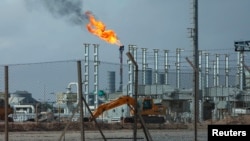TRIPOLI —
Libyan protesters - demanding more rights for the country's Amazigh minority - shut off Libya's sole natural gas export pipeline to Italy on Monday, a union official said, although supplies were not immediately affected.
Protesters of the Amazigh minority, or Berbers, last month seized the port at the Mellitah complex, located some 100 km west of Tripoli, and have already shut down oil exports from there.
The port is operated by Libya's National Oil Corp and Italian energy company Eni.
“We tried to convince them not to close the pipeline, but it's closed now,” Munir Abu Saud, head of the local oil workers' union, told Reuters.
Gas flows on the Greenstream pipeline to Italy were at 15.9 million cubic meters on Monday, the same amount requested by operators, data from gas grid operator Snam showed.
Gas exports from Africa's fourth-largest gas reserve holder to Italy, its sole buyer, have fallen since last year as production rates lag pre-war levels.
On Monday Ukraine halted gas imports from Russia which analysts said could also impact Italian supplies. Italy depends heavily on Russian gas.
A spokesman for the protesters camped out at the Mellitah complex said they had ordered the closure of the Italian pipeline because Libya's parliament and the government had not met their demands by Sunday.
“This time it is for real because the General National Congress (assembly) did not meet our demands,” the spokesman said.
The Amazigh protesters want their language guaranteed under Libya's planned new constitution and a bigger say in a committee to be elected to draft the constitution.
The GNC debated the issue on Sunday but has not yet found a solution, said GNC Spokesman Omar Humeidan.
Two years on from the 2011 overthrow of Libyan leader Moammar Gadhafi the country remains hobbled by violence, strikes and protests over political rights, jobs, and how its oil wealth is to be shared.
Prime Minister Ali Zeidan's weak central government has failed to control feuding armed militias or resolve political conflicts that are obstructing post-war reconstruction and efforts to build state institutions.
Most ports in eastern Libya are shut though the government had managed to end blockages of western ports in September.
Protesters of the Amazigh minority, or Berbers, last month seized the port at the Mellitah complex, located some 100 km west of Tripoli, and have already shut down oil exports from there.
The port is operated by Libya's National Oil Corp and Italian energy company Eni.
“We tried to convince them not to close the pipeline, but it's closed now,” Munir Abu Saud, head of the local oil workers' union, told Reuters.
Gas flows on the Greenstream pipeline to Italy were at 15.9 million cubic meters on Monday, the same amount requested by operators, data from gas grid operator Snam showed.
Gas exports from Africa's fourth-largest gas reserve holder to Italy, its sole buyer, have fallen since last year as production rates lag pre-war levels.
On Monday Ukraine halted gas imports from Russia which analysts said could also impact Italian supplies. Italy depends heavily on Russian gas.
A spokesman for the protesters camped out at the Mellitah complex said they had ordered the closure of the Italian pipeline because Libya's parliament and the government had not met their demands by Sunday.
“This time it is for real because the General National Congress (assembly) did not meet our demands,” the spokesman said.
The Amazigh protesters want their language guaranteed under Libya's planned new constitution and a bigger say in a committee to be elected to draft the constitution.
The GNC debated the issue on Sunday but has not yet found a solution, said GNC Spokesman Omar Humeidan.
Two years on from the 2011 overthrow of Libyan leader Moammar Gadhafi the country remains hobbled by violence, strikes and protests over political rights, jobs, and how its oil wealth is to be shared.
Prime Minister Ali Zeidan's weak central government has failed to control feuding armed militias or resolve political conflicts that are obstructing post-war reconstruction and efforts to build state institutions.
Most ports in eastern Libya are shut though the government had managed to end blockages of western ports in September.





